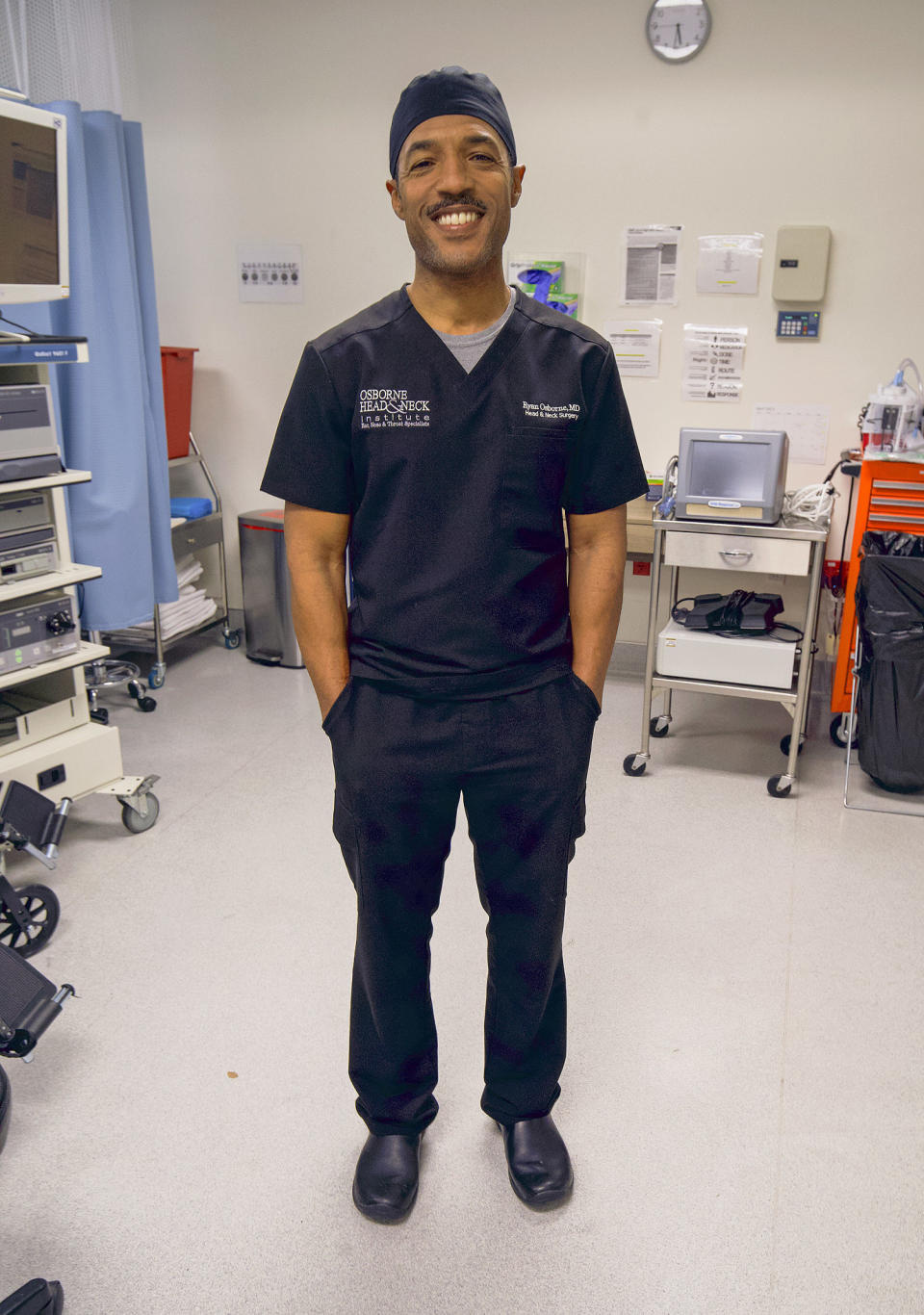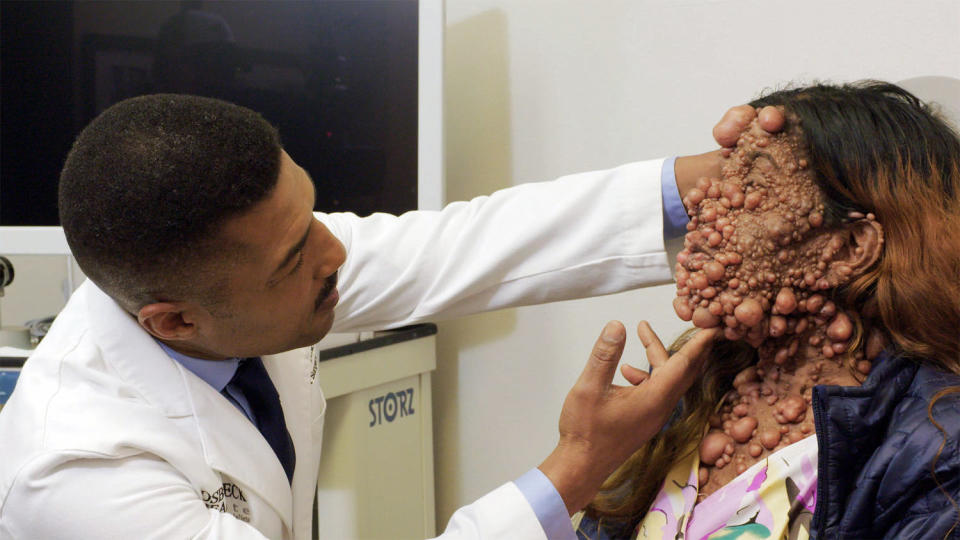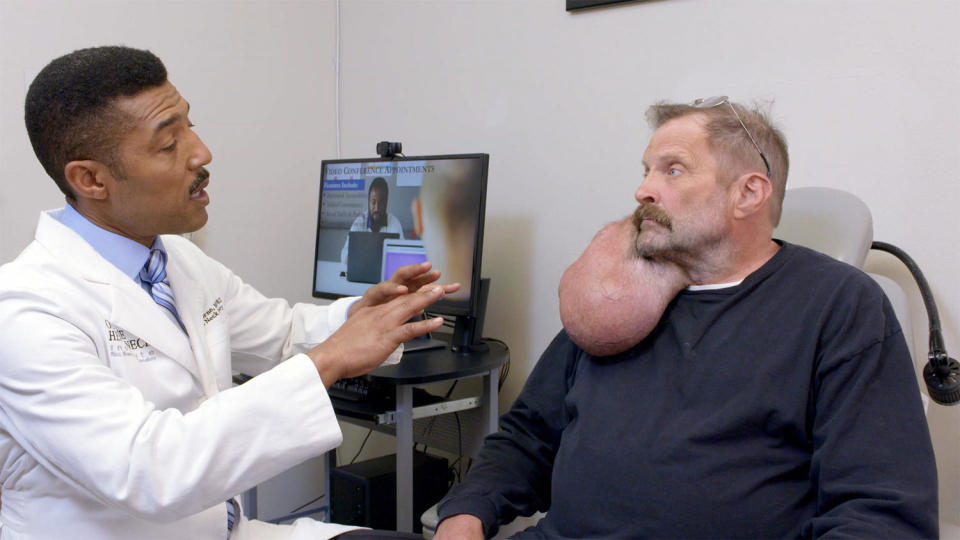Dr. Ryan Osborne of 'Take My Tumor' recalls the surgery he vowed to never do again
Dr. Ryan Osborne has known he wanted to practice medicine since he was 8 years old. His mother started bringing him along to her classes at university where she was studying to become a physician’s assistant when the family couldn’t afford a sitter.
“Her teacher wondered who that boy was playing in the hallway outside and said to bring me into the classroom and that I could sit with her each class,” Osborne recalls to TODAY.com. It was there he experienced his first anatomy lesson and where he became excited by healing powers of medicine.
Now director and surgical oncologist at the Osborne Head & Neck Institute in Los Angeles, Osborne is fulfilling his childhood dreams of practicing medicine as he specializes in cases that other surgeons are quick to pass on.
And he's doing all of this as a camera crew captures certain consultations and operations for TLC’s newest medical series, "Take My Tumor."

What is "Take My Tumor"?
In the series that first aired on April 3, three world-renowned surgeons — Osborne, Dr. Kimberly Moore Dalal and Dr. Jason Cohen — work each episode to help a variety of patients living with tumors that are disrupting their lives.
These patients include a 30-year-old woman carrying around a 20-pound sagging tumor that starts at the base of her head and extends to her waist, a man with a neck tumor so intertwined with his central nervous system that removing it is nearly as dangerous as letting it remain, a woman named Charmaine overtaken by so many tumors that there isn’t an inch of her skin that remains unaffected, and a California man whose head and neck tumor has become so large it’s disrupting his blood supply and making it impossible for him to sweat.
"Take My Tumor" brings viewers into the lives of each patient, showcasing how debilitating and dangerous living with a tumor can be — and the freedom that comes once it’s surgically removed.

Why are tumors dangerous?
The first thing to understand is that tumors are a lot more common than many people realize. Most of the tens of millions of people diagnosed with cancer each year have or will have some type of tumor. Tumors are growths or collections of abnormal cells that form somewhere in or on the body.
But Osborne says a common mistake many people make is thinking all tumors are cancerous. “There are two main types of tumors: malignant tumors and benign tumors,” he says.
Malignant tumors are cancerous and can spread to other parts of the body. “When a doctor tells you that you have a tumor, he is not telling you that you have cancer. He is saying that there is a mass or growth there, but he won’t know if it’s life-threatening (cancerous) yet or not.” Cancerous cells are later identified through a biopsy of the tissue within the tumor.
Some tumors are also classified as premalignant, meaning they could become cancerous over time if left untreated.
Benign tumors, on the other hand, are non-cancerous and usually not considered life-threatening unless they grow so large they begin to obstruct air passageways or disrupt vital organs. “Generally, more tumors are benign than malignant,” Osborne says.
Some benign tumors are able to grow to a dangerous size because unlike other cells, “tumor cells have found a way to evade the normal life and death cycle of a cell — meaning they’ve learned to exceed the amount of time they are supposed to live, and they also give birth to other cells that can do the same.”

The largest recorded tumor that has ever been removed came from a woman in 1991. It weighed 302 pounds. Incredibly, the woman made a full recovery. That tumor originated in the patient’s ovaries, but tumors grow into whatever tissue their cells start in. “If you have a tumor that originated in bone, it will be made of bone cells. If you have a tumor that originated from a nerve, it will grow into nerve tissue,” Osborne explains.
Where a tumor is located and how large it becomes will determine how much it affects the quality of a person’s life. “Tumors can be hugely impactful and disruptive,” says Osborne. In addition to the psychological trauma, “people with a large tumor are also less likely to get adequate work or pay because employers don’t want to hire them or only want to hire them in jobs that don’t require interfacing with the public,” he says.
He also highlights the “sheer physical changes” that people with tumors experience, including the hormones and enzymes that tumors can release, which affect metabolism, plus constant compression on blood vessels, nerves, bone and muscles.
“If you’re carrying around a 10-pound-tumor off the side of your face, it’s going to make eating, breathing, sleeping, and speaking so much harder,” Osborne adds.
Are all tumors operable?
When possible, malignant or cancerous tumors are usually surgically removed, as they will otherwise continue to spread. But treatment is often different for benign tumors.
Early in his medical career, Osborne says a mentor told him: “Every tumor is operable, but every tumor should not be operated on.” Though he didn’t fully understand the advice at the time, he’s come to appreciate his mentor's words in the years since. Osborne says every tumor grows differently, and some end up intertwining with complex organs and bodily systems to the point that removing the tumor might mean robbing someone of their quality of life.
He explains that some surgeons will remove the tumor anyway, and feel “as long as there is a beating heart, (they) have done (their) job.” But he says he doesn’t see things that way. “I don’t feel like my job is to treat tumors, I feel like my job is to treat people who happen to have a tumor,” he says.
He recounts a patient he treated early in his career who had tongue cancer that had become so widespread that the only way to remove the cancer completely was to remove the full tongue.
“The patient wanted to do it, and her husband was behind her, so we did it, we removed her entire tongue,” Osborne remembers. “We saved her life, but her quality of life drastically decreased. Within six months, her husband divorced her, she went into depression, she could never eat or drink by mouth again, and I remember that I was the only one who would go and spend the weekends visiting her,” he recalls.
In evaluating what her life had become, “I swore to myself, I would never do that surgery again.”
It’s inspired a philosophy he sticks with to this day. “I always ask myself if I would be happy with the quality of life I’m going to leave the patient with. If I can’t say yes, I don’t do the surgery.”
But he's always willing to consult with a patient to learn their priorities and will sometimes agree to start a surgery just to see how complicated a tumor actually is. In many cases, he discovers significant portions of a benign tumor can still be removed, even if a smaller part of it has to remain.
In one episode of "Take My Tumor," viewers meet a 15-year-old boy from Angola named Marcelo. During his operation, it becomes clear to Osborne that, though a significant portion of the tumor has been surgically removed, the patient may be left unable to speak or eat normally due to facial paralysis if he continues the operation.
Talking to Marcelo’s parents after the surgery, he says he chose to stop when he did because continuing would have affected Marcelo’s quality of life too much. “I wouldn’t do that on my own son,” he told them.
Since each case is so unique, Osborne couldn't pick an operation or patient in the series that stood out to him the most. “I said yes to each patient for a different reason, but they all spoke to me,” he tells TODAY.com.
“My patients are either fighting for their lives or are fighting for their quality of life,” he says. “They cannot operate on themselves, so they need someone who will champion their cause and shoulder their burden.” For as long as he’s been practicing medicine, he says, “that’s something I’ve known I’m willing to do.”
The season finale of "Take My Tumor" airs on TLC on May 8 at 10 p.m. ET/PT.
This article was originally published on TODAY.com

